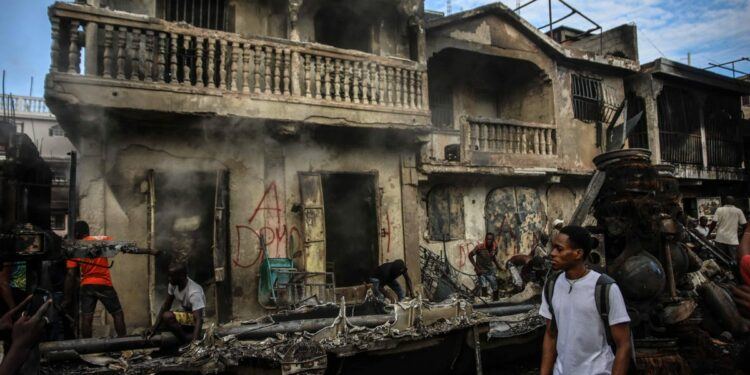Two days before Christmas, the deputy mayor of Cap-Haitien increased to 95 the number of Haitians who were burned alive on December 14 after an overturned tanker truck caught fire and exploded. According to press reports, about 100 residents gathered around the overturned truck trying to help themselves to the fuel when the fuel ignited.
The gruesome accident in Haiti, the poorest country in the Western Hemisphere, was at least the fourth such accident to occur in 2021, and the second in two months. As I wrote in these pages last month, on November 5, “while several thousand policymakers, researchers, and climate activists at the COP 26 meeting in Glasgow were trying to forge agreements on how to slash consumption of hydrocarbons, about 115 people were burned alive while trying to collect gasoline from a damaged fuel tanker truck near Sierra Leone’s capital city of Freetown.”
That accident followed a nearly identical accident on July 17 in Kenya. As one press report explained, “People had rushed to the scene with jerrycans to siphon off fuel from the overturned tanker before it exploded.” The initial death toll was put at 13, but was later increased to 20. About a month later, another accident happened in Lebanon, which is in the midst of a severe economic and energy crisis. According to Reuters, the Lebanese army “had seized a fuel storage tank hidden by black marketeers and was handing out gasoline to residents when the explosion occurred.” The initial death toll was put at 28 but was later increased to 33. Another 80 were injured.
It’s hard to imagine a worse way to die than being burned alive. And yet, over the past 12 months, at least 263 human beings were immolated — and every one of those deaths was caused by extreme energy poverty. The conflagrations in Haiti, Sierra Leone, Kenya, and Lebanon show how desperate people can be to get the energy they need to improve their lives. All four of these accidents show, yet again, that the defining inequality in the world today is the staggering disparity between the energy rich and the energy poor. More than 3 billion people around the world are living in places where per-capita electricity consumption is less than what’s used by an average American refrigerator.
In Haiti, according to the World Bank, per-capita electricity use is less than 40 kilowatt-hours per year. For comparison, in the United States, that figure is nearly 13,000 kWh per capita per year, or roughly 325 times as much as is used by the average Haitian. Meanwhile, in Sierra Leone, electricity use is so low the World Bank doesn’t publish any data for it.
But electricity poverty is only part of the story. Tens of millions of people around the world are so desperate for motor fuel that they will risk their lives to get a few liters of “free” gasoline or diesel. In 2019, about 270 people were burned alive trying to do just that. In January 2019, in Hidalgo, Mexico, about 85 people were burned alive while trying to collect gasoline from a pipeline that had been illegally tapped. In May 2019, in Niger, 76 people died after an overturned tanker truck exploded as crowds tried to collect spilled fuel. Two months later in Nigeria, a similar accident killed at least 45. As reported by the BBC: “People had gathered around the crashed tanker after the crash, with some attempting to salvage fuel.” In August 2019, about 64 people were killed in a similar accident in Tanzania. Per a news report, “People were trying to recover fuel from the vehicle, which had overturned on a major road, when it exploded.”
What makes all of this so stunning, or maybe the word is quaint, is that climate activists in rich countries never tire of denigrating hydrocarbons. To cite just two examples, in January, Bill McKibben, the founder of 350.org and arguably America’s most famous climate activist, published an article in the New Yorker in which he said if there is a “basic rule of thumb for dealing with the climate crisis, it would be: stop burning things” including natural gas. McKibben insists all of us should shift our energy needs to solar and wind energy and that “we can, and must, bring the combustion age to a swift end.”
About a week later, on January 28, in his state of the city address, Mayor Bill de Blasio declared that New York City will “renounce fossil fuels fully” and “ban fossil fuel connections in the city by the end of this decade, literally ensuring that our only choice is renewable energy.”
But when people like McKibben and de Blasio use the words “we” and “our” they have the luxury of living in places where hydrocarbons are so cheap and abundant that they can imagine a world where they aren’t needed. McKibben is a scholar in residence at Middlebury College, where annual tuition, fees, and room and board cost students $76,820 per year. When McKibben and de Blasio use words like “we” and “our” they aren’t speaking for the people who live in places like Cap-Haitien and Freetown.
The next time you hear a climate activist tell you how terrible it is that we are using hydrocarbons and that we should be using renewables, and only renewables, you might tell them about what happened this year in Cap-Haitien and Freetown. You might remind them that instead of complaining about climate change, they should be thankful for the plentiful energy that allows them to lead comfortable lives. You might also remind them that in 2021 alone, 263 human beings were immolated — burned alive — trying to get their hands on a few liters of motor fuel.











